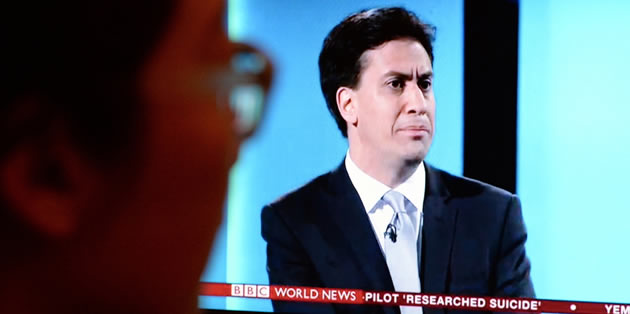The UK general election is likely to cause major fluctuations on the Pound Sterling (GBP) exchange rate and perhaps a stumble in UK economic growth in coming weeks as political party debates heat up significantly; but with polls so close, it’s hard to say who’s going to be running the country this time next month.
Not only are polls close, but they’re ever changing and sometimes with several released in one day, it’s making the election a tough call.
Friday showed the latest April 17th YouGov poll held the Conservative Party and Labour Party neck and neck with 34% of the votes each. Controversial party UKIP came next with 14%, followed by the Liberal Democrats with 7% and the Greens bringing up the rear with only 5%.
However, the poll was taken ahead of the TV debate which aired on Thursday night and some polls have suggested that in absence of Prime Minister David Cameron’s appearance, Labour leader Ed Miliband ‘won’.
The seat projection by the YouGov poll suggested that Labour would hold the majority with 294, followed by the Conservative Party with 275, the SNP are currently expected to hold 46, Liberal Democrats with 10, UKIP are forecast to hold 2 and the Green Party hold only one single seat.
General Election Fears Pressure Pound Sterling (GBP) Exchange Rate as Investors Prepare for Messy Election
For an outright majority, a party needs to win 326 seats and would gain full power; therefore, to achieve this, the Conservatives need to gain 27 seats on top of what they already have.
However, the seat projection seems a little interesting to me. Political party UKIP gained two seats in parliament last year, a surprise to many and an event that highlighted how unpredictable the election was set to be. It raised the distinct possibility that the UK was on the look-out for change.
However, several events have made the current Conservative government look good recently, like Friday’s decline in UK unemployment. The ecostat fell from 5.7% to 5.6% in February on the year.
IMF Praises UK Recovery – Pound Sterling (GBP) Exchange Rate Supported
Additionally, International Monetary Fund (IMF) chief Christine Legarde prasied the UK economy on Thursday, saying that the Conservative government’s economic strategy has been working and strengthening the UK.
Legarde stated: ‘It’s obvious what’s happening in the UK has worked.’
‘Generally in any election year, the teams that provide the hypotheticals on which future deficits are forecast, err on the side of caution and assume that whatever is announced is not necessarily or inevitably going to happen.’
However, the uncertainty from a general election, especially one as tense as this, can cause a decline in confidence, a delay in business and house buying activity and a general stuttering of the economy which pressures the Pound exchange rate lower.
The TV debate last night saw Ed Miliband and Nicola Sturgeon clash as she asserted the likelihood of her backing him to be Prime Minister if he didn’t reject austerity and prove to be ‘better than the Tories’, was slim to none.
However, the debate was missing both PM David Cameron and Lib Dem’s Nick Clegg, and there’s been much speculation over why Cameron has refused all debates bar one.
Ed Miliband made a last ditch attempt to call Cameron out, but has been mocked by viewers at home for ‘thinking he’s at Wrestlemania.’ Miliband looked at the screen and stated, ‘Debate me. One. On. One.’
Meanwhile, Cameron met with workers in Leeds on Thursday ahead of the debate and said during the open meeting: ‘This is my debate. Ask me anything.’
It seems, with so many possible outcomes, the rise of controversial parties and the very real possibility of a hung parliament looming, this year’s general election could have a really interesting conclusion.
Video courtesy of The Guardian
UPDATE: It appears that after complaint that the BBC debate was ‘politically fixed’, UKIP leader Nigel Farage is to hold his own 30-minute programme entitled: ‘Election 2015: Ask Nigel Farage.
One party spokesperson stated: ‘Nigel Farage is delighted to accept the BBC’s invitation to once again engage with the public.’
UPDATE: The latest Guardian/ICM general election poll has seen the Conservatives stay in the lead with 34% of the votes, Labour running just slightly behind with 32%, UKIP with 11% followed by the Lib Dems with 10%, and the Green Party with 5%.



